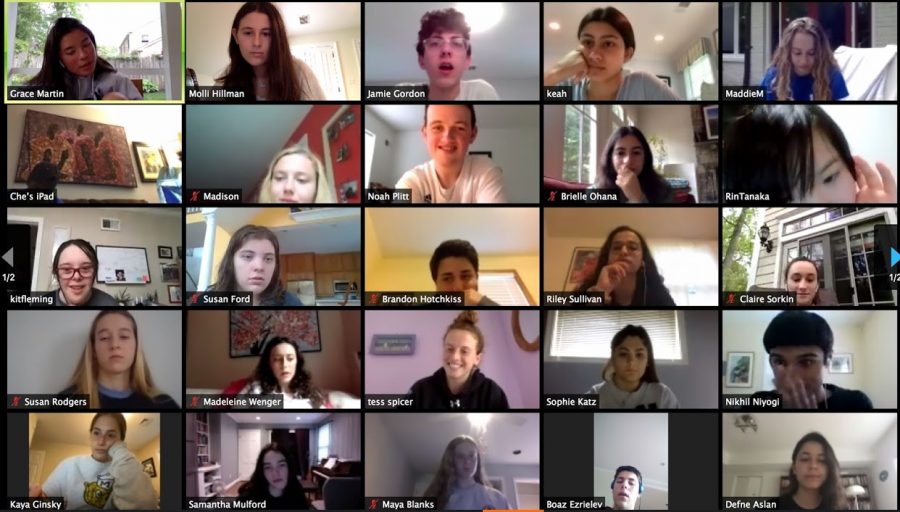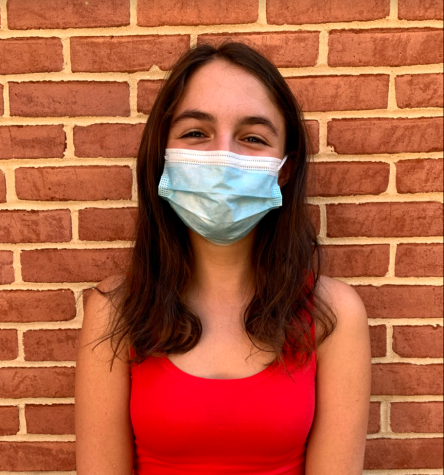How Whitman’s clubs have adapted to virtual learning
The Best Buddies club meets virtually over Zoom to play Pictionary.
January 16, 2021
Until the first brave soul hits their unmute button, the silence of a Zoom call can be deafening. The leaders of Whitman clubs and after-school activities understand this, and do their best to create an inviting and exciting virtual atmosphere. Over Zoom, students have to work extra hard to keep their clubs alive and thriving. With all MCPS schools beginning virtually, many crucial aspects of the student experience have had to be scaled back, including Whitman clubs. However, many of these student-led organizations are adapting to the online environment and finding ways to continue operating.
Robotics
A Robotics Club meeting would normally consist of a room packed with 60 students, access to power tools and constant hands on activities — an experience nearly impossible to replicate online.
Senior Zoe White, a member since freshman year, didn’t believe the club would be able to continue through the fall. But she and other senior members came together to pitch ideas and work diligently to continue events virtually.
“I’m sure that not a lot of other teams in the region are doing something like this,” White said. “I thought this was a lost year, but I’m really proud the seniors are stepping forward and doing this.”
Within the next month, each member will be delivered a “mini robot” to assemble themselves. During Zoom meetings, the team will program the robots to perform different tasks. The goal is for each member to have built a robot capable of finding Easter eggs by April.
As a freshman, White was hesitant to join the team due to the lack of female representation. She hopes that her peers will be willing to seek out new experiences and join the team, especially since it’s more difficult to form connections and friendships over Zoom, she said.
“One of the main things this team taught me is that I shouldn’t be intimidated,” White said. “I was able to realize stepping out of my comfort zone was a good thing.”
Vikes’ Minds Matter
For junior Lisi Derosa, the cycle of waking up, logging onto class, doing homework and going to sleep — all with limited peer interaction — is a draining one. To her, focusing on mental health is more important than ever before.
Derosa, along with sophomore Reagan Sanders and senior Lily Brady, came together to form Vikes’ Minds Matter — a safe space for students to discuss and learn about mental illnesses.
Brady noticed that the extended periods of self-isolation have taken a toll on many students’ mental well-being. But the quarantine has also compelled students to be more open about their mental health experiences.
“Especially right now, people are expressing emotions differently than before,” Brady said.
Vikes’ Minds Matter encourages Whitman students to come together and participate in student-led conversations about mental health over Zoom. The club will hold weekly in-depth discussions about different mental health issues, including depression, anxiety and eating disorders.
Brady hopes members will become comfortable with each other over Zoom, so that next year the club can really take off in person with pre-established connections.
“In person, it’ll be good because we will have met each other online,” Brady said. “Once we are in person that support is really going to kick in, because you can only do so much over zoom.”
Speech & Debate
Instead of taking the stage to debate topics ranging from offensive cyber operations to pharmaceutical drug prices, this year’s debate team will be logging on to laptops and arguing their points virtually. Though the club has attempted to preserve a similar online structure, it can be difficult to replicate the same competitive atmosphere in-person debate brings, Speech & Debate Student President Kushan Weerakoon said.
“Our team is very connected, but less people respond in discussions, and there are less jokes and laughter,” Weerakoon said. “The energy is as good as I could hope for, but definitely not as good as it is in person.”
Debaters will still prepare for tournaments, which will now be held virtually. Junior Chris Sylvester is most disappointed about missing the team bonding that occurs at tournaments, he said.
“Going to tournaments with your teammates is a great experience,” Sylvester said. “There are things you can do that can’t be done online, like late-night talks in hotel rooms and going to restaurants.”
Best Buddies
Best Buddies president Jamie Gordon loves the communal feeling of walking into a club meeting; glue-covered tables from the group’s most recent art project and a buzzing cafeteria are typical signs of a productive session. While he recognizes the club will face some obstacles online, Gordon aspires to maintain a similar warm environment over Zoom.
Best Buddies will continue to meet every other Tuesday as well as on the weekends for special events. The club aspires to create social opportunities for students with social disabilities, aiming for them to form long-lasting friendships with peers whom they may not have found outside the program. Gordon hopes members will continue to stay active this year and realize how valuable putting time and energy into Best Buddies is, especially under such constraining circumstances.
“Right now, people with intellectual disabilities are extra isolated just because they don’t have similar social skills that we do,” Gordon said. “What I’m looking forward to is being able to create this space of community, friendship and inclusion. Even if it’s just on Zoom.”











